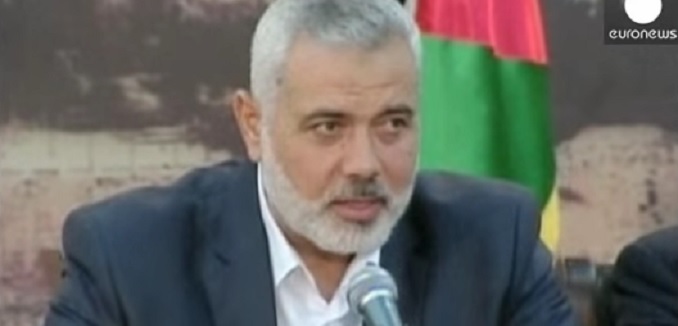Palestinian media outlets on Friday conveyed remarks by Hamas leader Ismail Haniyeh announcing that his group and the rival Palestinian Fatah faction had resolved issues surrounding the integration of security forces, as the two Palestinians organizations moved closer toward the implementation of a unity agreement aimed at establishing a single government ruling over the Hamas-controlled Gaza Strip and Fatah-controlled portions of the West Bank.
Gaza Prime Minister Ismail Haniyeh said on Thursday evening…”We agreed on all the details of the security file, we are committed to what we signed. We will not allow the return of security disorder to the Gaza Strip,” Haniyeh said in a graduation ceremony in the besieged coastal enclave. “We will not give up the weapon of resistance, and we will not forsake resistance,” Haniyeh added, stressing that Hamas “will not depart the position of manliness and dignity and will remain loyal soldiers of Palestine.”
Fatah officials in late April had announced a deal with Hamas to establish a single government. The move had been the latest in almost a decade’s worth of efforts designed to bridge gaps between the two factions, all of which had failed and many of which had deteriorated precisely because of differences over the disposition of various security forces. The security infrastructure of the Fatah-dominated Palestinian Authority (PA) is Western-backed and U.S.-trained, while Hamas has been armed with weapons – including tens of thousands of missiles – by Iran. There are multiple issues at stake.
Regarding integration, Hamas has long demanded that any deal that be reciprocal, with PA forces being brought into Hamas’s force structure and vice versa. The scenario, which would see the American-designated terror group avail itself of American resources originally given to the PA, is all but guaranteed to trigger an international backlash. Hamas’s projectile arsenal presents a separate problem. Putting it under the control of Western-backed PA forces would put the group at odds with its long-time Iranian sponsors, which whom Hamas officials have in recent months been seeking closer ties. The alternative – under which Hamas was permitted to maintain its own mini-army and Iranian-supplied missile arsenal independent of the central Palestinian government – would risk making any future Palestinian state into a mirror of Lebanon, under which Hamas maintaining a similar state-within-a-state to the one Hezbollah currently controls.
[Photo: euronews / YouTube]




